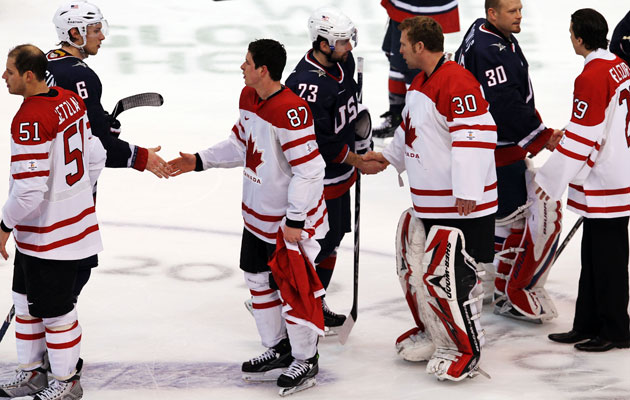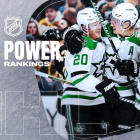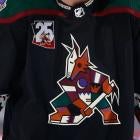Follow USA-Canada here
Ask any American hockey fan which team is considered USA's biggest rival in men's hockey and the answer will almost unanimously be Canada. The feeling hasn't always been mutual though as the Canadians measured themselves against the Soviet Union and later Russia for years.
Mostly that was because the Canadians were clearly the superior hockey nation in the relationship with the United States. The Americans were the little brother more than anything else despite sharing a massive border and the National Hockey League.
Little brother has grown up some and so has the rivalry. Don't take this American's word for it -- try Canadian alternate captain Jonathan Toews.
Canada's Jonathan Toews on facing USA: “It’s what it’s all about, Canada-USA. It’s become even a bigger rivalry than Canada-Russia."
— Chris Kuc (@ChrisKuc) February 19, 2014
Or how about Team USA coach Dan Bylsma?
"There isn't a bigger rivalry."
It is almost to the point that a Canada-USA matchup in the knockout round at the Olympics has become an expectation.
On and on it goes, the sentiment all the same. This rivalry is as big and as intense as it has ever been on the men's side. They can certainly thank the progression of the nations' rivalry at the junior level, where the USA has made great strides. You can look back to the 2004 World Juniors, when the US squad led by Zach Parise, Ryan Suter, Ryan Kesler and Co. won gold at a level that Canada long dominated. There was also John Carlson's golden goal against Canada in 2010. The battle has really tightened at the junior level in recent years and by extension as they have matured into NHL players, at the adult international level.
Before the two nations meet once again in the semifinals at the Olympics in Sochi on Friday, let's take a look back at the evolution of the growing rivalry that is going to add another high-stakes chapter (we're leaving out the juniors here after acknowledging their role up above and also bypassing on the world championships because really, they matter little to either nation). It began a long, long time ago.

1920 Olympics
Seven nations took part in the first Olympic hockey tournament but it might as well have been just two; the USA and Canada. Canada faced Czechoslovakia in the quarterfinals (there was no round robin) and won by a paltry 15-0 final. Not to be outdone, the USA drew Switzerland in its first match and nearly doubled the Canadian effort, winning 29-0. Yes, that was really the final score.
Unfortunately for drama's sake, the two met in the semifinals and that's where Canada struck first in the North American rivalry, winning 2-0. Canada would go on to defeat Sweden in the gold-medal game 12-1 while the USA would beat Sweden and Czechoslovakia by a combined 23-0 to win the silver.
1924 Olympics
The top of the podium looked the same in 1924 with Canada on top and the Americans in the silver position. These Games introduced pool play to the process so the USA and Canada didn't meet until the medal round.
In the final round, neither the USA nor Canada had any problems with Great Britain and Sweden, rolling right through each opponent. But when the two North American squads met, Canada prevailed with relative ease 6-1.
1932 Olympics
With the Games at Lake Placid, NY, only four nations competed and no surprise, it was once again the USA and Canada dominating. The only competition they had was against each other and that happened twice in a double round-robin format.
This time the games were as close as you can get. Canada won the first to open the tournament 2-1 in overtime. They met once more in the final game of the tournament and again the game went to overtime, this time without a winner. The final score was 2-2. A bit anticlimactic but Canada had a better record and thus won the gold again.
1936 Olympics
The tournament jumped up to 15 teams and for once it was enough to keep Canada away from gold. But the Canadians and Americans still ended up on the podium and clashed once again in the medal round.
It was another tight, low-scoring game that Canada won 1-0. After Canada lost to Great Britain and the USA tied the Brits, that was enough to give Canada the silver, USA the bronze. At this point, Canada is 4-0-1 against the USA in the Olympics.
1948 Olympics
Canada picked up yet another gold medal and managed to keep USA off the podium in the process. And for the first time on the biggest stage, the North American rivalry game wasn't close.
Canada put a hurting on the American squad, winning 12-3. Canada would just edge out Czechoslovakia to win the gold while USA finished fourth.
1952 Olympics
It was back to the olden days as Canada won the gold and USA the silver. With both teams in the medal round, of course they crossed paths and it was again favorable for the Canadians. At least good enough.
For the second time in the rivalry's history, the teams played to a draw in the medal round and by virtue of the USA losing to Sweden earlier in the tournament, Canada stood atop the podium. That's 5-0-2 for Canada.
1956 Olympics
It took more than 30 years but finally the USA got the better of Canada at the Olympics. Still, it was a silver medal for the Americans as the Soviet Union came to power in international hockey.
In the medal round the Americans scored a 4-1 win over Canada to relegate the Canadians to a very rare bronze medal.
1960 Olympics
On home soil, the Americans finally got their big Olympic breakthrough. The USA won its first of two hockey gold medals at Squaw Valley, Calif., going through the Canadians and Soviets in the process.
The USA pulled out a 2-1 win over Canada in the medal round and later defeated the USSR 3-2 to finish the medal round unbeated for the gold medal. Canada also defeated the Soviet Union and won silver, a reversal from the the early days of Olympic competition.
1964 Olympics
The North American teams started to hit their lean years but still ran into one another in the 16-team tournament in Innsbruck. Canada got past the USA by an 8-6 score but finished outside of the medals on the tie-breakers. The Americans finished fifth.
1968 Olympics
Once again crossing paths in the medal round, the USA again fell to Canada. The USA held a 2-1 lead going into the third period but Canada scored twice to take the 3-2 victory. It was enough to get Canada onto the medal stand with a bronze while the Americans finished sixth.
1984 Olympics
Canada didn't send its team to the Olympics in 1972 or 1976, instead playing the Soviets in the famed Summit Series. That was about as strong a sign as any of who Canada saw as its hockey rival. The teams didn't meet in 1980 either when the USA won gold for the second time with the Miracle on Ice.
In 1984 the two found each other in the same group for a pre-medal-round clash and it was again Canada winning, defeating the USA 4-2. Neither country would finish with a medal, however.
1994 Olympics
In just the second meeting in nearly 30 years at the Olympic level, Canada and USA were once again in the same pool for their only meeting. Nobody came out on top, the game coming to a close with a 3-3 tie. Canada went on to take silver; the US finished off the podium.
1996 World Cup of Hockey
Before the NHL players competed in the Olympics, the NHL set up an international event and the North Americans ended up in the same group as it was initially divided by geography. Brett Hull and John LeClair led the American team that faced Wayne Gretzky and company in Philadelphia in the pool play and picked up the win 5-3.
That was just the first of two matches though as the USA and Canada eached reached the final and this time it was on Canadian soil in Montreal. Again, though, it was the USA winning, truly signaling the Americans were on the rise against the Canadians. It was the first major blow in the rivalry in 40 years from the American side. It wasn't the Olympics but it was a changing moment in the evolution of the rivalry.
1998 Olympics
In the first year with the NHL players taking place, Canada and the Americans again were in the same group, meaning their only matchup in the tournament didn't have the same heavy implications. That didn't make the 4-1 win for the Canadians any less stinging to the Americans, though.
At this point you could see why the Canadians still weren't overly concerned with Team USA, going 9-2-3 vs. the USA in Olympic play. But as the World Cup in 1996 showed, things were going to get more interesting soon.
2002 Olympics
With the Olympics back on American soil, the rivalry between the North American countries started to grow and perhaps hit its apex. The two nations met not only in the medal round in Salt Lake City, but in the gold-medal game.
Led by captain Chris Chelios, the Golden Age of American hockey still wasn't quite up to snuff against the mighty neighbors to the north and it was Canada spoiling the party with a 5-2 win in the final to win its first gold since 1952.
2004 World Cup of Hockey
In the second (and to this point last) version of the World Cup, again the teams were divided into regional groups so again the US and Canada met in the preliminary round. Back in Montreal where the USA won the tournament in 1996, Canada edged out the Americans 2-1.
2010 Olympics
If 2002 was the apex then what happened in 2010 was an entirely new level. It's also when the rivalry, which had been really starting to grow at the junior level and on the women's side, hit its highest of highs.
This time it was Canada's turn to play the host and the pressure was on. Canada came in as a heavy favorite with Sidney Crosby leading a mega-talented group but the USA was coming in with a young team and low expectations. That changed when the USA pulled the stunner and knocked off Canada 5-3 in pool play to win the group and go into the knockout round as the top seed.
That was just the appetizer for the gold-medal game that many call the greatest hockey game they have ever seen. Certainly it had more than enough drama and excitement. Canada was the stronger of the two teams but Ryan Miller stood on his head and the USA forced overtime with a Zach Parise goal in the final minute. Canada returned the dramatic favor, though, with Crosby's golden goal that managed to get by Miller and the party was on. It was becoming clearer, though; the US and Canada rivalry was a big deal.




















